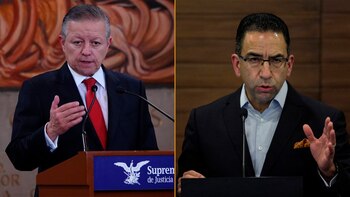
Javier Lozano Alarcón, former head of the Ministry of Labour and Social Security (STPS), broke out against the four ministers of the Supreme Court of Justice of the Nation (SCJN) that endorsed the Electricity Industry Act in favor of the Federal Electricity Commission (CFE).
Through his official Twitter account, the member of the National Action Party (PAN) shared a photograph of the faces of the members of the highest court of justice in the country and accused them for having voted against the action of unconstitutional.
He also pointed out that both Arturo Zaldivar, Loretta Ortiz, Jazmín Esquivel and Alfredo Gutiérrez Ortiz Mena were exhibited before the society; however, he welcomed the fact that the rest of the plenary session had “turned its back” on them.
“These were the four ministers who voted in the direction that AMLO wanted the action of unconstitutionality of the Electricity Industry Law: @ArturoZaldivarL @lorettaortiza. Jasmine Esquivel and Alfredo Gutiérrez Ortiz Mena. They were exhibited. Most turned their backs on them,” he wrote this Thursday, April 7.

However, it was not his only argument, since Lozano Alarcón asked his followers for restraint and tranquility, because within “the bad”, this decision will cause other legal reactions.
According to the politician from Puebla, the fact that the unconstitutionality of the law has not been approved, but that the decision has had detractors will generate protection, which may cause obstacles to the development of the law.

This Thursday saw the discussion of the law that was promoted by President Andrés Manuel López Obrador (AMLO) and which was endorsed by both chambers of the Congress of the Union in 2021.
The 11 ministers had a day of discussion and voting on the most important articles, in which the action of unconstitutionality that had been presented due to an alleged privilege of the CFE was denied.
The fact is that the Plenary of the Court was divided with four positions in favor of the project, while seven ministers voted for unconstitutionality; however, eight votes were required for that effect.

As part of the actions that will continue after this day, the dispatch mechanism that operates in the country will continue to be in force, so the National Energy Control Center (Cenace) will give priority to CFE plants.
In addition, it was allowed to continue the dispatch of hydroelectric power plants; Federal Electricity Commission power plants; wind and solar energy of private individuals, as well as combined-cycle power plants.
However, because renewable energy plants cannot meet all energy demand in the country, the commission will continue with most of the market.

Finally, after the first recess, it was also declared that the law does not violate the International Treaties in which Mexico is registered, especially those that respond to economic matters with the Trans-Pacific Association and the Free Trade Agreement with the United States.
In addition to stating that it is constitutional for the government to revoke permits or contracts in the electrical industry, considering that the principle of non-retroactivity and legal certainty is not violated.
KEEP READING:
Últimas Noticias
Debanhi Escobar: they secured the motel where she was found lifeless in a cistern

The oldest person in the world died at the age of 119

Macabre find in CDMX: they left a body bagged and tied in a taxi
The eagles of America will face Manchester City in a duel of legends. Here are the details

Why is it good to bring dogs out to know the world when they are puppies




